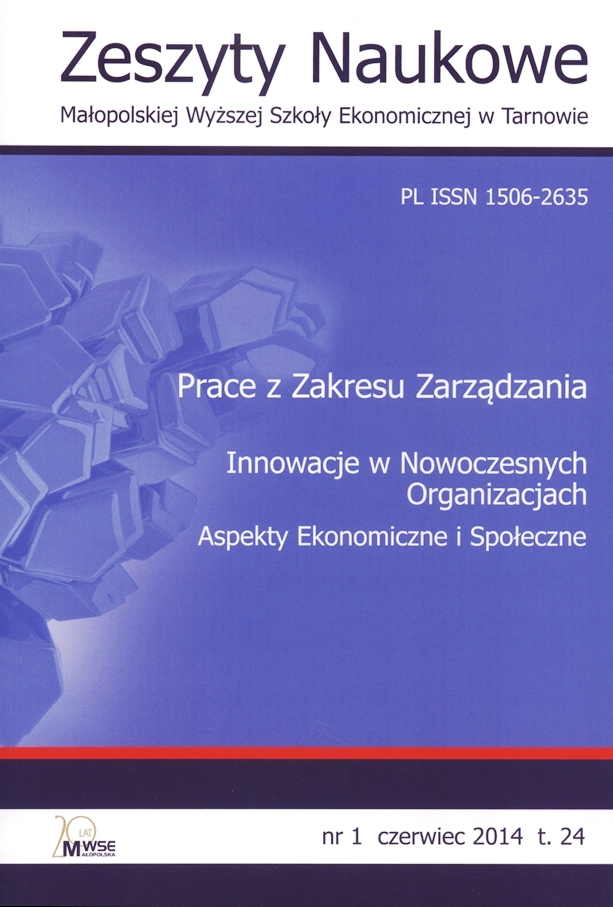Abstract
The aim of this article is to present the concept of analysis aimed at evaluating the ability of innovative companies. The starting point for the estimation of the innovative potential of the surveyed companies, while the reference is a system of innovative enterprises. The basic problem that is described in this paper is the identification of the determinants of innovation potential and assess their effectiveness as a condition for the development of innovative activities and promote innovation also to formulate innovation capacity model of enterprises. Outlined in research required to develop the concept of diagnostic analysis aimed at evaluating the potential and innovative capacity of the company. An important research tool is the analysis of the relationship between the resources and the capacity, which shows the relationship of cause – effect relationship between these categories. The empirical part of the article presents the results of research on the assessment of the degree of innovation of enterprises Malopolska region. The research included 316 companies. It has been found that it is primarily the knowledge and skills of employees of companies, organization of work and cooperation between the actors of the industry, is the degree of innovation of the company. The main source of innovation enterprises is so knowledge workers and knowledge acquired from outside, from other organizations.
References
Arend, R.J.I., Bromiley, Ph. (2009). Assessing the dynamic capabilities view: spare change, everyone? Strategic Organization, 7(1), 5–10. DOI: 10.1177/1476127008100124.
View in Google Scholar
Bratnicki, M., Zbierowski, P. (2012). Szukanie przedsiębiorczego podłoża problemów kreowania efektywności organizacji: struktura nośna oparta na dynamicznych zdolnościach. W: J. Buko (red.). Kształtowanie procesów innowacyjnych w nowoczesnych organizacjach. SOOIPP Annual 2012 (s. 77–92). Ekonomiczne Problemy Usług, nr 90. Szczecin: Wydawnictwo Uniwersytetu Szczecińskiego.
View in Google Scholar
Danias, K., Kavoura, A. (2013). The role of social media as a tool of a company’s innovative communication activities. The Małopolska School of Economics in Tarnów Research Papers Collection, 23(2), 75–83.
View in Google Scholar
Foss, K., Foss, N.J., Klein, P.G., Klein, S.K. (2007). The entrepreneurial organization of heterogeneous capital. Journal of Management Studies, 44, 1165–1186. DOI: 10.1111/j.1467-6486.2007.00724.x.
View in Google Scholar
Gloet, M., Samson, D. (2013). Knowledge Management to Support Systematic Innovation Capability [online, dostęp: 2014-03-12]. Dostępny w Internecie: http://www.hicss.hawaii.edu/hicss_46/bp46/ks4.pdf.
View in Google Scholar
Hall, M.C., Williams, A.M. (2008). Tourism and Innovation. New York: Routledge. ISBN 9780415414043.
View in Google Scholar
Innowacje i wiedza (2006). Biuletyn Informacyjny. Ostrów Wielkopolski: Centrum Innowacji i Wiedzy Innowacyjnej Południowej Wielkopolski w Ostrowie Wielkopolskim, nr 3, s. 2.
View in Google Scholar
Kozioł, L., Pyrek, R., Kozioł, W., Wojtowicz, A. (w druku). Relationship marketing – a tool for supporting the company’s innovation process. Procedia.
View in Google Scholar
Mikuła, B. (2006). Organizacje oparte na wiedzy. Kraków: Wydawnictwo Akademii Ekonomicznej. ISBN 83-7252-302-9.
View in Google Scholar
Tidd, J., Bessant, J., Pavitt, K. (2002). Managing Innovation: Integrating Technological, Market and Organizational Change. New York: John Wiley & Sons. ISBN 9780471496151.
View in Google Scholar
Wojtowicz, A., Kozioł, L. (2012). Koncepcja aliansów wiedzy w procesie innowacji. Zeszyty Naukowe Małopolskiej Wyższej Szkoły Ekonomicznej w Tarnowie, 20(1), 211–223.
View in Google Scholar
Żołnierski, A. (2005). Potencjał innowacyjny polskich małych i średniej wielkości przedsiębiorstw. Warszawa: Polska Agencja Rozwoju Przedsiębiorczości. ISBN 83-60009-07-4.
View in Google Scholar
© Copyright by Małopolska School of Economics in Tarnów. The articles are available under the Creative Commons Attribution NonCommercial-NoDerivatives 4.0 International License


